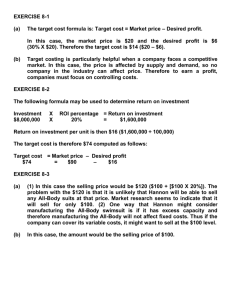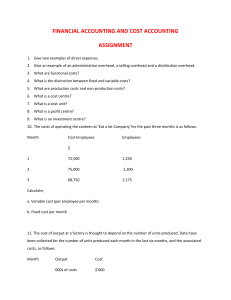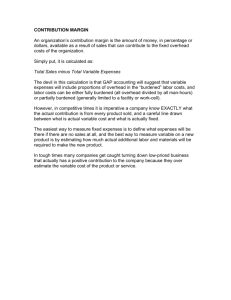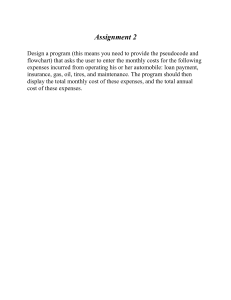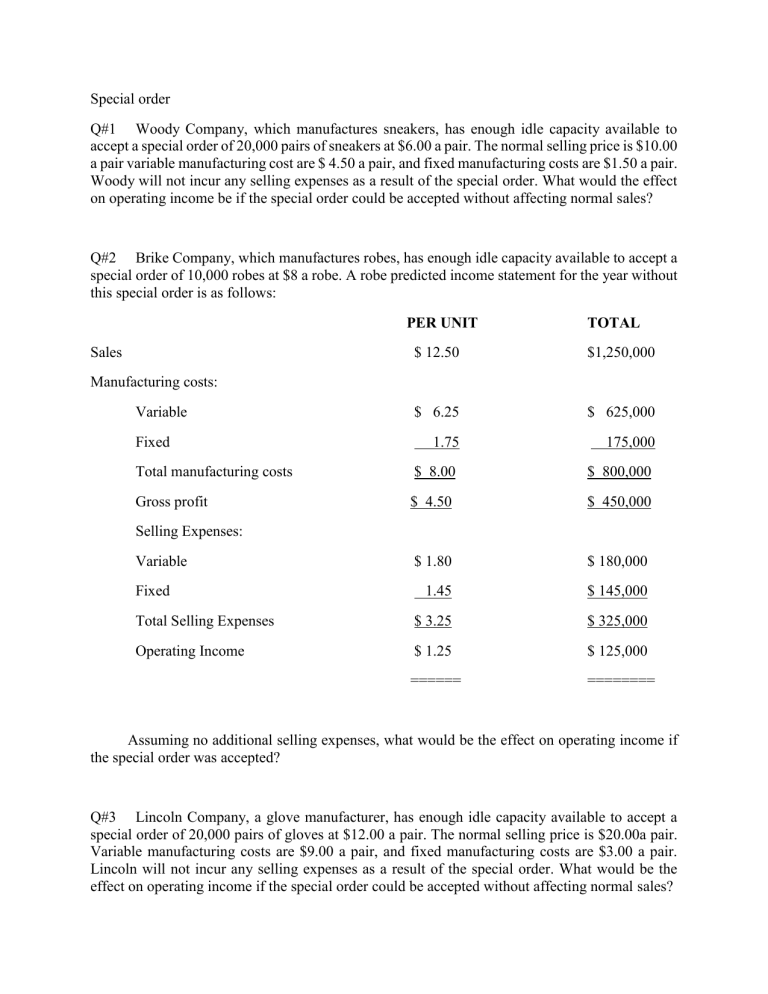
Special order Q#1 Woody Company, which manufactures sneakers, has enough idle capacity available to accept a special order of 20,000 pairs of sneakers at $6.00 a pair. The normal selling price is $10.00 a pair variable manufacturing cost are $ 4.50 a pair, and fixed manufacturing costs are $1.50 a pair. Woody will not incur any selling expenses as a result of the special order. What would the effect on operating income be if the special order could be accepted without affecting normal sales? Q#2 Brike Company, which manufactures robes, has enough idle capacity available to accept a special order of 10,000 robes at $8 a robe. A robe predicted income statement for the year without this special order is as follows: PER UNIT Sales TOTAL $ 12.50 $1,250,000 $ 6.25 $ 625,000 1.75 175,000 Total manufacturing costs $ 8.00 $ 800,000 Gross profit $ 4.50 $ 450,000 $ 1.80 $ 180,000 1.45 $ 145,000 Total Selling Expenses $ 3.25 $ 325,000 Operating Income $ 1.25 $ 125,000 ====== ======== Manufacturing costs: Variable Fixed Selling Expenses: Variable Fixed Assuming no additional selling expenses, what would be the effect on operating income if the special order was accepted? Q#3 Lincoln Company, a glove manufacturer, has enough idle capacity available to accept a special order of 20,000 pairs of gloves at $12.00 a pair. The normal selling price is $20.00a pair. Variable manufacturing costs are $9.00 a pair, and fixed manufacturing costs are $3.00 a pair. Lincoln will not incur any selling expenses as a result of the special order. What would be the effect on operating income if the special order could be accepted without affecting normal sales? Q No.4 Boyer Company manufactures basketballs. The forecasted income statement for the year before any special orders is as follows: AMOUNT PER UNIT Sales $ 4,000,000 $ 10.00 Manufacturing cost of goods sold $ 3,200,000 8.00 Gross profit $ Selling Expenses Operating income $ 800,000 $ 2.00 300,000 $ .75 500,000 $1.25 ========= ====== Fixed costs included in the above forecasted income statement are $1,200,000 in manufacturing cost of goods sold and $100,000 in selling expenses. A special order offering to buy 50,000 basketballs for $7.50 each was made to Boyer. There will be no additional selling expenses if the special order is accepted. Assuming Boyer has sufficient capacity to manufacture 50,000 more basket balls, by what amount would operating income be increased or decreased as a result of accepting the special order? Q#5 The manufacturing capacity of Jordan Company's facilities is 30,000 writs of product a year. A summary of operating results for the year ended December 31, 19X2, is as follows: Sales (18,000 units @ $100) $ 1,800,000 Variable Manufacturing and selling costs 990,000 Contribution Margin $ 810,000 Fixed costs $ 495,000 Operating Income $ 315,000 A foreign distributor has offered to buy 15,000 units at $90 per unit during 19X3. Assume that all of Jordan's costs would be at the same levels and rates in 19X3 as in 19X2. If Jordan accepted this offer and rejected some business from regular customers so as not to exceed capacity, what would be the total relevant income from accepting the special offer? Q No.6 Evaluating a special Order Bawling Company manufactures footballs and has enough idle capacity to accept a special order for 20,000 footballs to be sold for $14 each. The footballs normally sell for $20 each. The variable manufacturing costs are $10 per balls, and fixed manufacturing overhead is $5 per ball. There will be no additional selling or administrative costs related to the special order, and the special order will not affect normal sales. Required: Calculated the effect on net income if the special order is accepted. Q No.7 Evaluating a Special Order Clean-it Company produces cleaning kits for shotguns. The production capacity available will enable the firm to produce 500,000 kits annually. A projected income statement for next year shows Sales (460,000 kits) $4,600,000 Costs of goods sold 2,960,000 Gross profit 1,640,000 Selling and administrative expenses 1,250,000 Net income $ 390,000 Fixed manufacturing overhead costs included in the cost of goods sold are $ 1,120,000. A 10% sales commission is paid to sales representatives for each kit sold. The purchasing department of a large discount chain has offered to purchase 30,000 kits at $6 each. The Clean-it Company sales manager’s initial response is to refuse the offer because he concludes that the $6 price is below the firm’s average cost 2,960,000/460,000. The sales commission would not be paid on the special order. Required: A. Should the special offer be accepted? What would be the impact on net income? B. Assume that the offer was for 50,000 kits. Should it be accepted? Show your calculations. C. Ignore part B. What is the lowest price the firm could accept if it wants to earn annual net income of $480,000? Q No.8 Evaluating a Special Order Driftwood Company produces flower vases. The operating results of the preceding year were: Sales(77,000 units@ $8) Cost of goods sold Direct materials Direct labor $616,000 115,500 154,000 Manufacturing overhead Total Gross profit Selling expenses Administrative expenses Total operating expenses Net income 92,400 361,900 254,100 38,500 23,100 61,600 $192,500 The company has received a special order to buy 10,000 vases at a unit cost of $6.80. Materials cost per unit would not change, but the labor costs for the special order would be 20% greater than normal since some overtime wages would be incurred. Fixed manufacturing overhead is 50% of the variable manufacturing overhead at the present level of production. Fixed manufacturing overhead would not change and there would be no additional variable or fixed selling expenses. The administrative expenses, which are all fixed, would increase $2,000 if the special order is accepted. Current variable selling expenses are $0.20 per unit. The company has a maximum capacity of 85.000 vases, so the company would have to reduce its regular sales by 2,000 units if it accepts the special order. Required: A. Should the company accept the special order? Why? B. What would be the effect on the firm’s profits? Q No.9 Evaluating a Special Order Flame Company manufactures gas grills and is considering expanding production. A distributor has asked the company to produce a special order of 8,000 grills to be sold overseas. The grills would be sold under a different brand name and would not influence Flame Company’s current sales. The plant is currently producing 95,000 units per year. The company’s maximum capacity is 100,000 units per year, so the company would have to reduce the production of units sold under its own brand name by 3,000 units if the special order is accepted. The company’s income statement for the previous year is presented below: Sales(95,000 units) Cost of goods sold: Direct materials $2,375,000 Direct labor 1,900,000 Manufacturing overhead 1,425,000 Gross Profit Selling expenses 575,000 Administrative expenses 237,500 Net income $7,125,000 5,700,000 1,425,000 812,500 $ 612,500 The company’s variable manufacturing overhead is $ 10 per unit and the variable selling expense is $5 per unit. The administrative expense is com0pletely fixed and would increase by $5,000 if the special order is accepted. There would be no variable selling expense associated with the special order, and variable manufacturing overhead per unit would remain constant. The company’s direct labor cost per unit for the special order would increase 20% while direct materials cost per unit for the special order would increase 10%. Fixed manufacturing overhead and fixed selling expense would not change. Required: If the distributor has offered to pay $65 per unit for the special order, should the company accept the offer? Justify your answer. Make or buy Q#1Dixon Company manufactures part 347 for use in one of its main products. Normal annual production for part 347 is 100,000 units. The costs per 100 units is as follows Direct material……………….. Direct labor………………....... Manufacturing overhead: Variable ………………............ Fixed ……………….............. Total costs per 100 units……... Solve the following two unrelated questions: $260 100 120 160 $640 Q No.2: Evaluating a Make-Buy Situation A manufacturer of television sets is considering ways to increase the firm’s plant capacity utilization because it has recently been operating at 70% of capacity. One proposal is to make a component which is currently being purchased for $75 per unit. Based on a study by the firm’s controller, the cost to produce the component is as follows: Direct materials $24.00 Direct labor(3 hours@ $11.20 per hr) 33.60 Manufacturing overhead(applied based on direct labor hrs) 24.00 Total $81.60 The anticipated work activity for the year is 250,000 direct labor hours. Fixed manufacturing overhead for the year is budgeted at $1.75 million. Required: You have been asked by the controller to determine if the component should be built internally or purchased. Calculate the per unit cost differential between making and buying the component.

